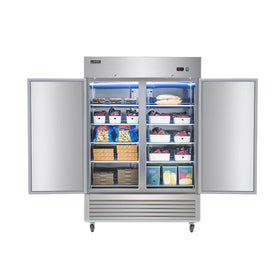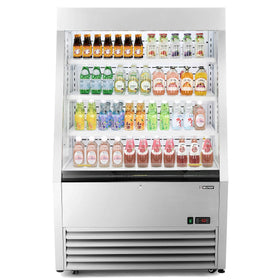Like many other fruits and vegetables, you can store your apples in a fridge or in a freezer. In the fridge, apples generally last between 4-8 weeks, and in the freezer, they may last between 8 months and a year if you follow all precautions and store them properly.
- If you need to store your apples for a short period (4-8 weeks), store them in the fridge.
- If you need to store your apples for longer, you can freeze them. Apples can last 6-8 months in the fridge and even longer if they are sliced and properly treated.
If you are uncertain about when next you’d have to use your apples or intend to use them at a much later date, it is advisable to freeze them.
How Long Do Apples Last? Fridge vs Freezer
Here’s a quick comparison of how long apples last in the fridge vs. the freezer:
| Apple Type | In the Fridge | In the Freezer |
| Whole, fresh apples | 4–6 weeks | 6–8 months |
| Sliced (treated) | 3–5 days | 8–12 months |
| Sliced (untreated) | 3–5 days | 6–9 months |
| Whole, frozen | — | 6–8 months |
Keep in mind: freezer quality depends on air exposure, so use freezer bags or containers and get as much air out as possible. If you’ve got a vacuum sealer, that's even better.
How to Store Apples in the Fridge
1. Store them at 32–40°F (0–4°C)
The best temperature for storing apples in the fridge is between 32–40°F (0–4°C). Colder temps slow down the ripening process, keeping your apples firm and fresh longer.
Toss them in the crisper drawer or a plastic produce bag for best results.
2. Put them in the Crisper Drawer
Apples prefer a humid environment, which the crisper drawer naturally provides.
This helps prevent them from drying out and getting that wrinkly, tired look.
Bonus tip
If your fridge runs a little dry, you can loosely wrap apples in a damp paper towel or keep them in a perforated plastic bag to boost humidity.
3. Store apples away from strong-smelling items.
Apples produce ethylene gas, which speeds up ripening—for themselves and for other fruits.
On the flip side, they also absorb odors, which can mess with their flavor.
- Store apples away from strong-smelling items like onions or garlic.
- Keep them separate from ethylene-sensitive produce like leafy greens or berries.
- Use a sealed container or bag to minimize both odor and gas exchange.
4. Pick the Right Apples to Begin With
Not all apples are built the same when it comes to shelf life. Generally, firmer varieties of apples naturally last longer in the fridge than softer varieties.
| Firmer Varieties (4-8 weeks in the fridge) | Softer Varieties(2 to 4 weeks in the fridge) |
| Granny Smith | Gala |
| Fuji | Red Delicious |
| Honeycrisp |
Best Fridges For Storing Apples
For storing several apples for a restaurant or commercial avenue, consider a reach-in refrigerator.
For a shop, bakery, convenience store, or supermarket, consider a commercial display refrigerator.
Signs Apple Has Gone Bad
The most obvious sign that an apple has gone bad is that it develops soft or mushy spots. However, if your apple shows any of the following signs, it has gone bad
- Wrinkled skin
- Leaky or sticky residue
- Weird smell
- Color changes, especially around bruises
Apples are one of the few fruits that truly thrive in the fridge if you give them the right conditions. Cool temps, humidity, a bit of personal space—they’re not high-maintenance, just particular.
Can You Freeze Apples?
It is entirely possible to freeze apples, and if you are trying to prevent food waste, stock up, or prep for baking and cooking at a later date, then freezing your apples is a smart move.
However, frozen apples are different from fresh apples and are often better for cooked dishes than eating raw, Moreover, the freezing process may vary depending on whether you are freezing sliced apples, whole apples, or fresh apples.
How to Freeze Apples
1. Freezing Sliced Apples
The most effective and convenient way to freeze apples is to slice them up. Sliced apples last about 8-12 months in the freezer, and they are tidy, easy to portion, and perfect for tossing into whatever recipe you choose.
How to freeze sliced apples
- Wash, core, and slice the apples (peeling is optional).
- Soak slices in water with either 1 tablespoon of lemon juice per quart of water, or 1/2 teaspoon of salt per quart of water (yes, salt works too!)
- Let them sit for about 5 minutes. This keeps browning in check.
- Drain, pat dry, and lay the slices in a single layer on a baking sheet.
- Freeze until solid, then transfer to a freezer-safe bag or container.
Pro tip: Label your bags with the date and variety of apples.
2. Freezing Whole Apples (You Can Do It… But)
Technically, you can freeze whole apples. However, it is not advised to freeze whole apples unless you’re freezing them for a very specific use—like baked apples or applesauce.
- Freezing whole apples takes up more space, and they take longer to thaw. Also, the texture tends to get mushy around the core.
- Frozen whole apples also only last around 6-8 months in the freezer, which is 4-6 months shorter than sliced apples.
How to freeze whole apples
- Wash and dry them thoroughly.
- Place them in a freezer-safe bag.
- Squeeze out as much air as possible.
Optional: You can core them first if you know you’ll want them ready for baking.
3. Fresh Apples Without Lemon Juice (Still Okay!)
Ideally, you should always treat your apples with lemon juice, salt water, or Vitamin C power prior to freezing.
However, if you are in a hurry, or maybe you just ran out of lemons, you can freeze apples without any lemon juice treatment.
However, here’s what will happen if you freeze your apples without treatment:
- They’ll brown during freezing and thawing due to oxidation.
- The flavor’s mostly fine, but the appearance can be unappetizing.
- If you’re baking or making applesauce, the browning won’t matter much.
Alternatives to lemon juice:
- Saltwater soak (brief and then rinse).
- Ascorbic acid powder (aka vitamin C powder) mixed with water.
What Are Frozen Apples Good For?
Apples aren’t exactly the same after freezing. When apples freeze, the water inside expands. That breaks down the crisp structure we all love in a fresh apple.
This means the apple slices will be softer after thawing. The texture may be somewhere between firm apple pie filling and tender cooked apples.
However, frozen apples are perfect for the following uses:
- Baking (just toss 'em in frozen)
- Cooking (applesauce, chutneys, jams)
- Smoothies (no need to thaw!)
Store Your Apples in an Etl Certified Freezer
4. Should You Blanch Apples Before Freezing?
Blanching is optional, but if you want your apples to last even longer, it is a good idea to blanch them before freezing. Here’s why blanching is important:
- It kills enzymes that cause browning and texture loss.
- It’s great for apples you plan to freeze for longer periods.
How to Blanch Apples
- Boil sliced apples for 1–2 minutes.
- Immediately plunge it into ice water to stop the cooking.
- Dry thoroughly and follow the freezing steps as with sliced apples.
Quick Tips for Freezing Apples
Before you go loading up your freezer with apples, a few pro moves:
- Freeze flat first: Spread slices on a baking sheet so they don’t clump.
- Use within a year: The sooner, the better for the best flavor.
- Don’t thaw before baking: Just toss frozen slices straight into pies or crumbles.
- Label everything: Variety, prep date, and any notes (like “lemon-treated” or “sweet”).
Wrapping It Up
If you’re after convenience, sliced apples with a quick lemon or saltwater soak are your best bet. Whole apples are okay, too, just not the first choice. And even if you skip the treatments, your apples will still be good for cooking and baking later.
Explore more blogs on how to preserve your food. You can learn how long steak stays in the fridge and find out whether freezing hummus is a good idea.










